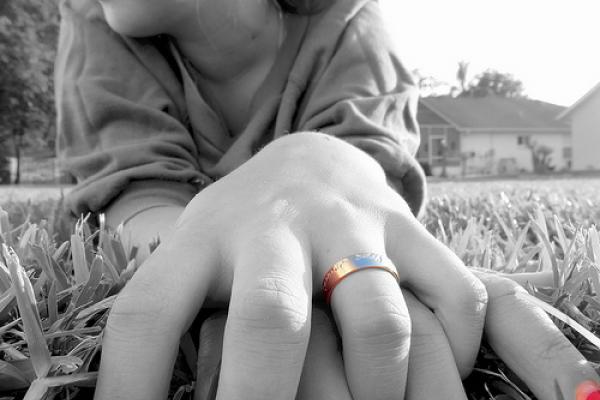"Chastity is getting a makeover. Surrounded by a sex-saturated society, millions of young people are pledging to remain virgins until their wedding night. But how, exactly, are evangelical Christians convincing young people to say no when society says yes?"
So writes Christine J. Gardner in her brilliant new book Making Chastity Sexy: The Rhetoric of Evangelical Abstinence Campaigns.
Making Chastity Sexy is important and perceptive in a profound way that casts light on a large subject — religion in general and evangelicalism in particular when it comes to attitudes toward sex, life, and religion.
Gardner (an evangelical herself who teaches at an evangelical school) takes her readers far beyond the mere investigation of sex education/abstinence campaigns to make the point that individualistic society and the autonomous self have become the sole means of the "wait until marriage" virginity-sanctifying movement.
In other words the evangelicals are using pop culture techniques just to make abstinence "sexy."
Implicit in the abstinence sex "education" programs being promoted around the country, on which billions of dollars have been spent by the government (particularly during the Bush era), is the belief that committing to delay sex until marriage makes sense only if one has a personal commitment to follow Jesus Christ.
At the heart of the campaigns that are supposedly about sex education is a belief that without a "new life in Christ" the life of abstinence is almost impossible to follow. Thus abstinence only programs such as True Love Waits, Silver Ring Thing, and the Pure Freedom are selling virginity as a sexy choice of personal affirmation using consumerist techniques that are promising "better sex, no, in fact "great sex" and perfect marriages if virginity is maintained as a "gift" for the prince or princess, God will lead you to as a reward for putting on that ring, signing a pledge, and putting off sex until marriage.
Studies have shown that those who pledge to maintain their virginity and who do not keep the pledge are less likely to use contraception when they break their pledge and have sex. A 2009 study published in the magazine Pediatrics uses the data to compare pledgers and non-pledgers who share similar characteristics and found that, after five years, the pledgers were just as likely to have had sex as the non-pledgers.
Other studies have found that the sexual behavior of virginity pledgers does not differ from that of closely matched nonpledgers, and that the pledgers are less likely to protect themselves by use of contraception.
These abstinence programs fail in their long-term objective, but are a resounding success if "success" is measured in terms of finding excuses to hold large religious gatherings and reinfoce the evangelical beliefs of the young people at those gatherings.
Because when those same young people fail to keep their pledges, they feel the full weight of evangelical guilt on their shoulders and thus, far from being driven from the movement, are driven to their knees to confess their sins to their home churches and remain part of the evangelical community wherein the glue that binds them to that community is the guilt of their own failure.
Such abstinence-only programs set up young people to fail doubly. First, as the book notes, at best sexual activity is delayed only by a few months or years and then, when the young person enters into sexual relationships, he or she is more exposed to pregnancy and venereal disease, not less. That's because abstinence-only programs do not fall into the category of comprehensive sex education (and thus actual education about sex). Condom use and so forth goes out the window, because their use would imply premeditated sin.
The real message of abstinence-only is, "Don't do it, but if you do do it, (since you're sinning) don't compound the sin by planning to sin."
What takes Gardner's book into new territory is its analysis of how the various groups, such as Silver Ring Thing, have used the modern feminist rhetoric of choice (based on a primary language of individualism) to sell the notion of Christian chastity. The way the chastity argument is pitched to young people is that if they wait until marriage, sex will be better and — as a bonus — their choice to remain virgins is celebrated as a self affirming "stand" against the secular culture.
To put a finer point on it: they're using sex — and the message of individualism and personal choice — to sell the abstinence message. From attractive Christian celebrity spokespersons to the sale of panties printed with virginity slogans, the abstinence movement harnesses the power of sex to make chastity appealing to the media-saturated, "texting," screen-addicted generation.
Abstinence-only rallies wind up looking more like the rollout of a new line of the Victoria's Secret knickers and bras than anything most evangelical great-grandmothers would have recognized as advocating chastity.
The American abstinence version of "sex education" depends on a fairytale narrative to reinforce definitions of female and male stereotypes. The "princess" (i.e., the young woman) waits passively for her "true prince" (who by definition cannot be sexually active outside of marriage) to "rescue" her from virginity, spinsterhood, and the dominant secular culture. Each fairytale princess in the abstinence movement's narratives is rewarded for waiting by finding her true love and living happily ever after.
The fairytale narrative presumes an audience that expects a reward for its sacrifice (read: sexual abstinence).Thus, a fairytale happy ending to remaining virgins is great sex, great marriages, and oh yes, a shot at spending eternity in heaven.
The abstinence movement promotes the idea that happy marriages and relationships can be guaranteed by "saving" one's virginity for the Prince or Princess of God's choice.
The abstinence fairytale narrative also implies that its audience consists exclusively of heterosexuals who, for the most part, define their identities by traditional evangelical gender roles. Those who remain single by choice or otherwise — let alone gay men and women — are excluded entirely from such abstinence programs since virginity is sold as a guarantor of good marriages, assuming, of course, that marriage is the be all/end all of all relationships.
Feminism is the bogeyman here, as professional and domestic callings are set up as archenemies. For some young people, focusing on a divine romance with Jesus can function as a substitute for or avoidance of earthly romances. Gardner points out how one of her evangelical male college students told her that girls have turned him down for dates because, as he put it, "they are too busy dating Jesus."
Gardner convincingly makes the argument that the abstinence movement works against the most profound Christian values of selflessness and sacrifice, instead adopting rock-concert-style, celebrity-saturated pop culture techniques as a means to get people to turn against that same pop culture!
The end result of the abstinence-only movement is that evangelicals are selling their spiritual birthright to adopt techniques to sexily sell "no sex" to a pop-culture-saturated generation. But the technique undermines the fundamental message of the gospel.
Because the Christian gospel, whatever its other virtues or lack thereof, is not in the business of pitching a consumerist lifestyle where virtue is rewarded by good times.
Nowhere in the abstinence-only movement is the idea presented that young people need to "take up your cross and follow me," as Jesus taught. Abstinence is pitched as a cool thing to do and its reward will be even better sex and more fun. The Disney Corporation, Wal-Mart and the "ethic" of corporate America are well represented here, but the actual still small voice of Christian morality is lost.
[Begin personal rant]: What also seems to be missing, both in the abstinence movement and in this wonderful book, is a plan for what actually might work to bring balance to the seesaw between insane levels of sexualizing youth on one hand and abstinence on the other that our culture is riding. My personal curmudgeonly view is pretty clear on this: What we really need is art, music, literature, beauty, drama, and everything else that builds a life of aesthetic wonderment and engagement.
The last thing we need is more shock-and-awe, so-called "youth" events with laser shows pandering to pop culture and consumerism as a way of building "character." What both the evangelical subculture and the rest of our society lack today is a vision of sexuality as a normal part of a wondrous life that seeks — at every level — quality above quantity, and beauty above triviality.
If I were writing a sex education curriculum for the whole culture —teens, young adults, and otherwise — it would begin with aesthetics and the love of art. Keep sexuality beautiful and promote high culture from kindergarten on, less pop more classical music, less TV more Shakespeare, less guitar lessons and more piano lessons and yes this sounds "elitist" but if you want to talk about values why not the best?
It's precisely this aesthetic component that is sorely lacking, both in consumer and corporate America, which keep selling us the lowest common denominator in every area of life, from our personal relationships to corporatized social media as a replacement for actual, physical community.
In a culture that does "texting" better than it does conversation, where our young people leave high school barely educated and hardly speaking their own language, the least of our problems is when they have sex. The big problem is that we have perfected an ugly culture that has turned sex into a consumer product in the same way that strip malls, urban blight, and sprawl have destroyed American communities.
[End personal rant.]
According to a 2008 survey by the Barna Group, evangelical and other "born-again" Christians divorce at the same rate as other Americans. The message of great sex may resonate more strongly with evangelical youths than the message about waiting for sex. If sex is so great and the reward for abstinence, then why wait?
It's a message young people in the abstinence-only programs are clearly grasping, because on average they only delay sexual activity by some 18 months after signing abstinence pledges. And thanks to the abstinence only programs when they do have sex they're going to have unprotected sex because they regard their sex as shameful.
You don't plan to sin. So sex, when it happens outside of marriage, is a pledge-breaking sin and something to be done secretly, hidden away from those who would judge you.
Evangelicals have become part of the status quo, muzzling their religious voice in favor of "connecting" with young people. Gardner's book makes a convincing argument that the unintended consequence of abstinence-only programs is to further infuse consumerist, individualistic, and selfish "values" into the evangelical movement, reinforcing the guilt attendant on sexual activity outside of marriage in a way that drives young people away from the use of condoms, exposure to truthful counseling, and the ability to negotiate their sexual experiences in a positive way.
Frank Schaeffer is a writer whose many books include the best-selling Sex, Mom, and God: How the Bible's Strange Take on Sex Led to Crazy Politics--and How I Learned to Love Women (and Jesus) Anyway
.
Got something to say about what you're reading? We value your feedback!
